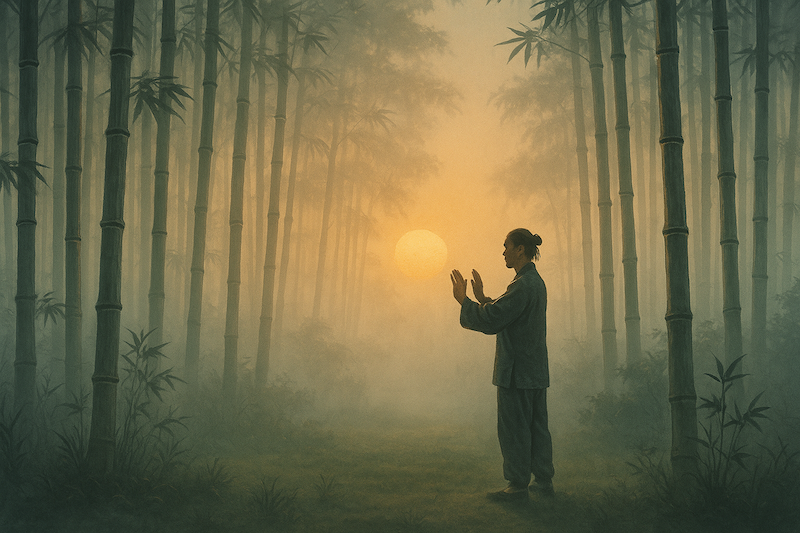
🧘♀️ How Qigong Supports Longevity: A Natural Way to Stay Young
Have you ever wondered if there's a natural way to live longer, not just in years, but in vitality? For centuries, people in China have turned to a practice that blends breath, movement, and stillness—qigong. Now, Western wellness seekers are rediscovering its powerful potential.
Qigong supports longevity by calming the mind, improving circulation, and strengthening the body from within. Rooted in Traditional Chinese Medicine (TCM), this ancient practice is being backed by modern science as a path toward graceful aging and deeper health.
🌿 What Is Qigong?
Qigong (pronounced “chee-gong”) is an ancient Chinese system of movement, breathing, and focused intention. Its name literally means “energy work.” Dating back over 2,000 years to Daoist and medical texts like the Huangdi Neijing (Yellow Emperor’s Inner Canon), qigong was developed to:
-
Prevent illness by maintaining energy balance
-
Treat disease through breath and posture
-
Extend life through inner harmony
From dynastic China to modern wellness centers, Qigong supports longevity not just by adding years to life, but life to years.
🧠 The Science Behind Longevity and Qigong
Western research has increasingly validated the physiological impact of qigong:
-
A meta-analysis published in The American Journal of Health Promotion found qigong significantly reduces cortisol, anxiety, and fatigue, while improving immune response and quality of life NIH source.
-
Studies show qigong reduces oxygen consumption by up to 16%—even more than during sleep—indicating a deep state of metabolic restoration Harvard Health.
-
Qigong practitioners demonstrate more synchronized brainwave patterns and elevated serotonin levels, enhancing cognitive longevity PubMed.
These findings help explain why Qigong supports longevity through both mental and physical optimization.
🧬 How Qigong Affects Your Body and Aging Process
From both Eastern and Western lenses, qigong brings a wide range of benefits.
🌱 Traditional Chinese Medicine (TCM)
According to TCM, Qi and blood must circulate freely to avoid illness. Qigong helps by:
-
Clearing blockages in meridians
-
Enhancing the function of the lungs, kidneys, and spleen
-
Strengthening the Yuan Qi, or core vitality, that governs aging
Practitioners often report feelings of heat, tingling, or movement of Qi—indicating internal flow and balance.
🔬 Modern Scientific View
Scientific research confirms that:
-
Qigong boosts immune response by increasing T-cell activity
-
It lowers blood pressure, cholesterol, and inflammation markers
-
It improves neuroplasticity and slows the degradation of brain cells
In fact, qigong is being studied as part of integrative care plans for hypertension, anxiety, and even cancer recovery Mayo Clinic.
🌄 How to Practice Qigong for Longevity
Getting started is simple and doesn’t require equipment:
-
Find a calm setting – Outdoors in nature is ideal, but even a quiet room works.
-
Adopt a standing or seated posture – Relax your shoulders, soften your knees.
-
Begin mindful breathing – Inhale gently, exhale slowly and longer.
-
Add gentle movements – Circle your arms or sway from the waist slowly.
-
Focus your intention – Visualize energy settling in the belly (dantian).
Even 15 minutes daily can improve your balance, calm your nervous system, and over time, help your body age more gracefully.
Experience Qigong in Its Cultural Home with Puyu Retreat
At Puyu Retreat, we curate immersive wellness experiences in China’s most serene landscapes—from ancient tea mountains to sacred forest temples. Our retreats offer not just Qigong classes, but true cultural immersion with seasoned instructors and peaceful surroundings.
💌 Interested in how Qigong supports longevity?
Subscribe to our newsletter to get updates on upcoming retreats, healing traditions, and the wisdom of Eastern well-being.
👉 What aspect of longevity are you most curious about—nutrition, movement, or mindset? Let us know, and we might cover it in our next post.


